Special Reports
The Musical America Recording Surveys
 As part of this special report on The Recording Maze, Musical America surveyed its audience of performing arts professionals to determine how artists, artist managers and presenters across the industry are attempting to succeed in their businesses with recording activities.
As part of this special report on The Recording Maze, Musical America surveyed its audience of performing arts professionals to determine how artists, artist managers and presenters across the industry are attempting to succeed in their businesses with recording activities.
In addition—as we’ve always known—these same industry professionals are serious performing arts enthusiasts, so Musical America conducted a separate survey to also discover their preferences for buying and listening to recordings.
The Business Survey
Most respondents—68%&mash;are either artists or artist managers; the rest fell into the category of presenter or public relations firm. Those in the larger group were given one set of questions—let’s call them Group A; the remaining 32%, n presenting or public relations, were directed to a different set of questions. We’ll call them Group B.
However, we first asked a couple of questions.
Group A: Artists and Artist Managers
The recording landscape no longer has one clear road to success and that is apparent from the response of artists and artist managers. These respondents are taking a multi-pronged approach to creating, distributing, and marketing recordings. Here is what we found:
What is your involvement with producing recordings?
The majority of respondents produce recordings independently and/or with a partner organization. But 33.3% d not, meaning, most likely, that they are signed to a record label.

What is your involvement with financing recordings?
Most of this group finances its recordings either independently and/ or with a partner. But an impressive 43 % aparently have the luxury of using some one else’s money—again, probably a label (and a major one, at that). The first group was also asked to comment on its funding sources.

A few of the answers:
- “A combination of artist’s funds, fund-raising through crowdsourcing, and some of my own money.”
- “Self-funded, Kickstarter, and grants.”
- “Using live material and interns to produce the recording results in extremely low production costs.”
- “I pay for the recording. The record company pays for [everything else].”
- “Primarily financed through donations to our nonprofit organization.”
What is the usual distribution format of the recording?
The preference in format for classical recordings remains the CD. Downloading comes in second, streaming a distant third.

*What methods of distribution do you use for the recordings?
Unlike the old days, when record labels took care of pretty much everything except the artistic side (although they weighed in heavily on that as well), getting recordings to consumers is an all-hands-on-deck effort. Even respondents who rely entirely on a third party get
personally involved through their web sites, social media, lobby sales, and other means.
For instance, when asked what methods of distribution are used for their recordings, the artists and artist managers answered that they are using many different methods (the respondents were able to choose more than one method):
- 65% dstribute their own recordings through their own web sites and/or at concerts
- 49% ue third parties who take a percentage of sales to distribute recordings, such as iTunes, Avie, etc.
- 49% ue a third party who does everything—producing,financing, distributing and marketing.
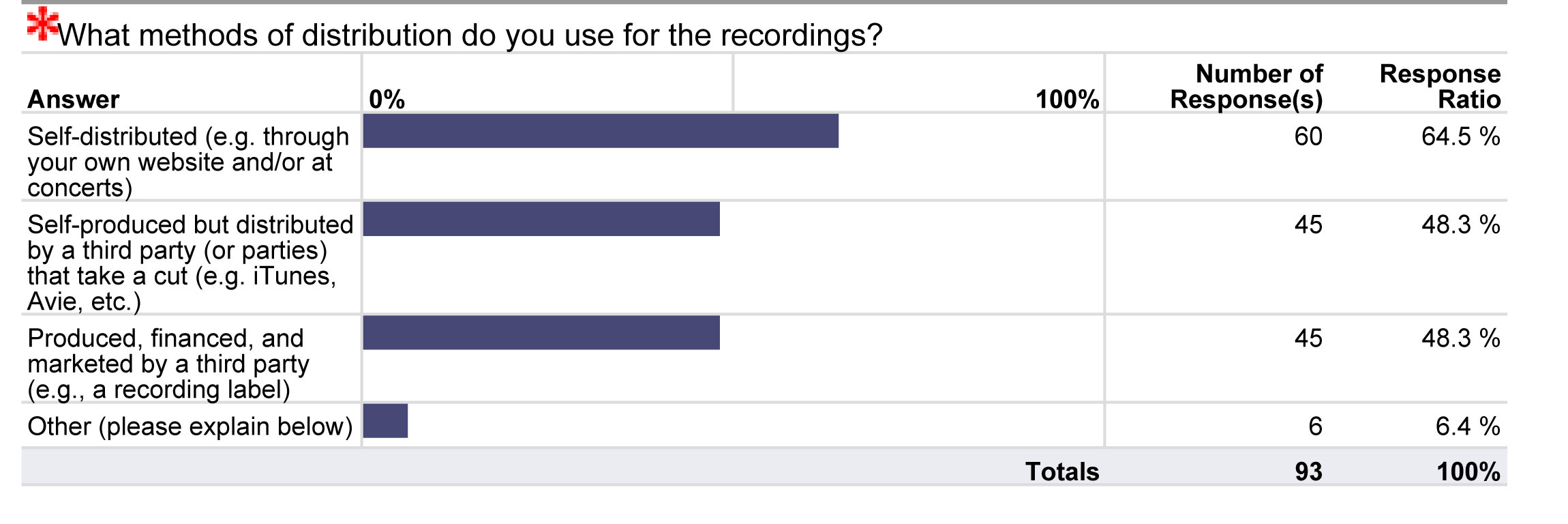
One comment from a respondent:
- “My agent and I hand physical CDs out to people we speak with at music conferences; the disc is an important sonic business card.”
- “Every option is considered, including joining with other artists who have more marketing savvy.”
- “I market at my own performances, and through my web site.”
What methods of marketing the recordings do you use?
The respondents were asked to rank each marketing method on a scale of 1 to 5 (1=Never, 2=Rarely, 3=Sometimes, 4=Often, 5=Always).
Not surprisingly, free marketing was the answer with the highest ranking. Free marketing includes methods such as email, social media, and owned web sites.
However, surprisingly, the next most popular option is using a third party or co-producer to handle all of the marketing, which includes hiring a public relations firm.
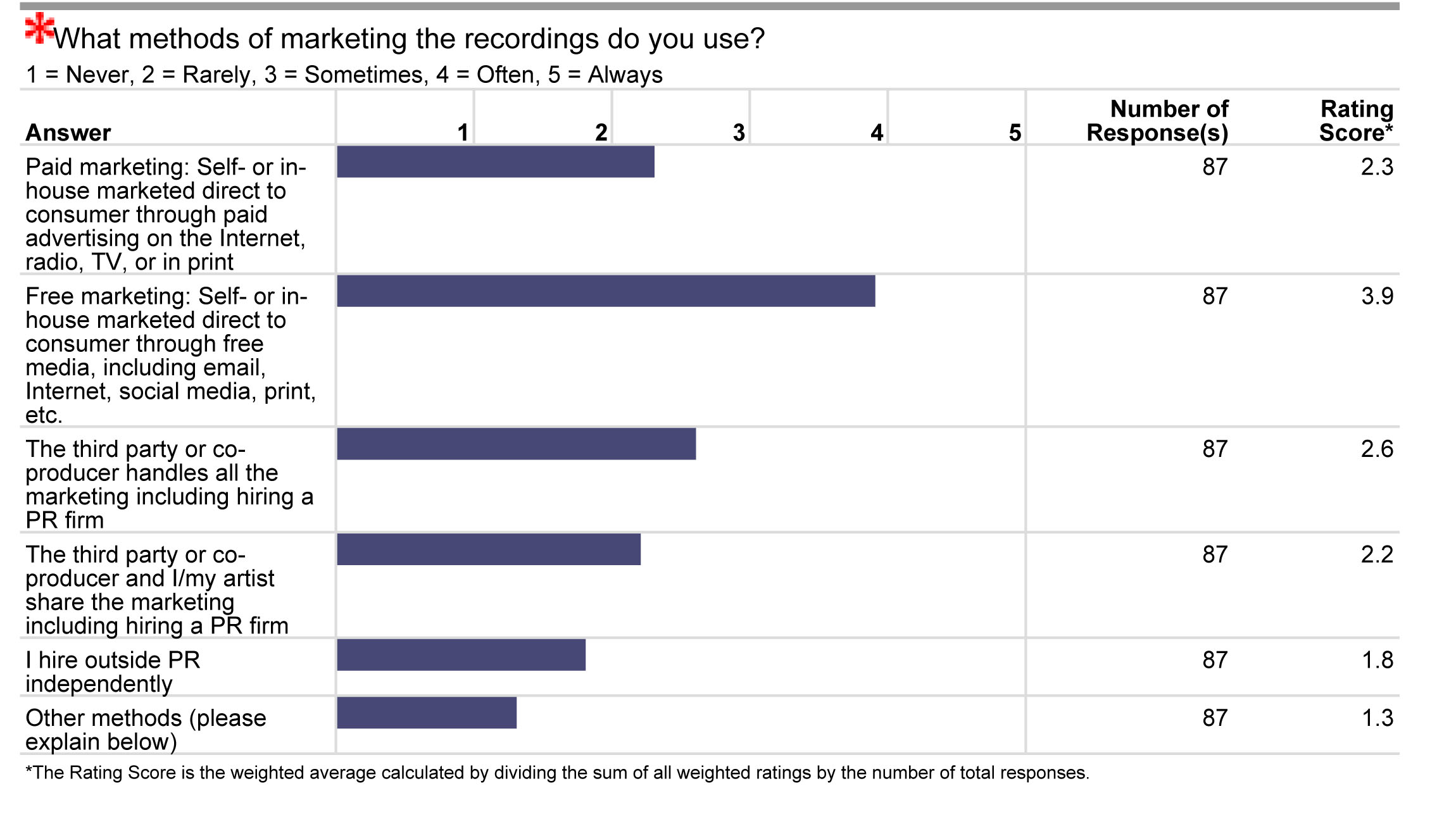
But that doesn’t mean that artists and artist managers are reluctant to use their own effort when spending their own money. Paid marketing was the next most popular choice. Paid marketing is “self- or in-house marketing director to consumers through paid
advertising on the Internet, radio, TV, or in print.
If you have made a recording(s) or plan to, what is the primary reason to do so?
Nearly 80% o artists who already have a recording out or plan to make one did so to obtain bookings and do general promotion. (About half of the presenters said they are more likely to book artists who have released a recording.)

The 20% o artists who said they produced their recordings for reasons other than promotion or to secure bookings had this to say (a sampling):
- “The challenge and artistic satisfaction.”
- “As an ensemble we have things to say about our music.”
- “Document new compositions.”
- “Document new repertoire and make it available to others.”
- “The joy of sharing my talent.”
Group B: Presenters and PR firms
Respondents who identified with this group were directed to just two questions:
If an artist has a recording out, are you more likely to book him or her?
Answers were not as clear-cut as we had anticipated. While the majority said yes, an equal number to those who said no answered,
“it depends.” Some comments:
- “It depends….Certainly [yes] for our international artist….With emerging artists, it helps to have something of decentquality,…but I am just as happy watching/listening to a well-made live video recording.”
- “It depends on if it is self-released or supported by a label.”
- “Recommendations weigh more [than a recording].”
- “In my country it depends on whether the recording is supported here by a distributor who will push promo copies to media outlets. A self-produced recording is pretty much just a business card.”
If an artist has a recording out, do you sell his or her recordings in the lobby or bookshop of the venue at the time of the concert?
In keeping with the “whatever it takes” mentality of distribution, the overwhelming response here was in the affirmative. A few comments:
- “Usually, the artists bring recordings for our staff to sell. We keep15% o the gross.”
- “If the artist requests.”
- “We have an arrangement with a local record store….They are willing to provide recordings...relating to a performer who appears at our venue. This has proven to be quite satisfactory.”
The Consumer Survey: Quick Summary
Answers to consumer questions, addressed to the same group that answered our business questions, yielded the following results.*
In the last six months, most respondents (by an admittedly small margin) spent as much as $500 on recordings purchases (with 1% sying they’re not sure how much they spent, but “it’s resembling the U.S. trade deficit”); at the other end of the spectrum, 22.4% sent $25 or less.
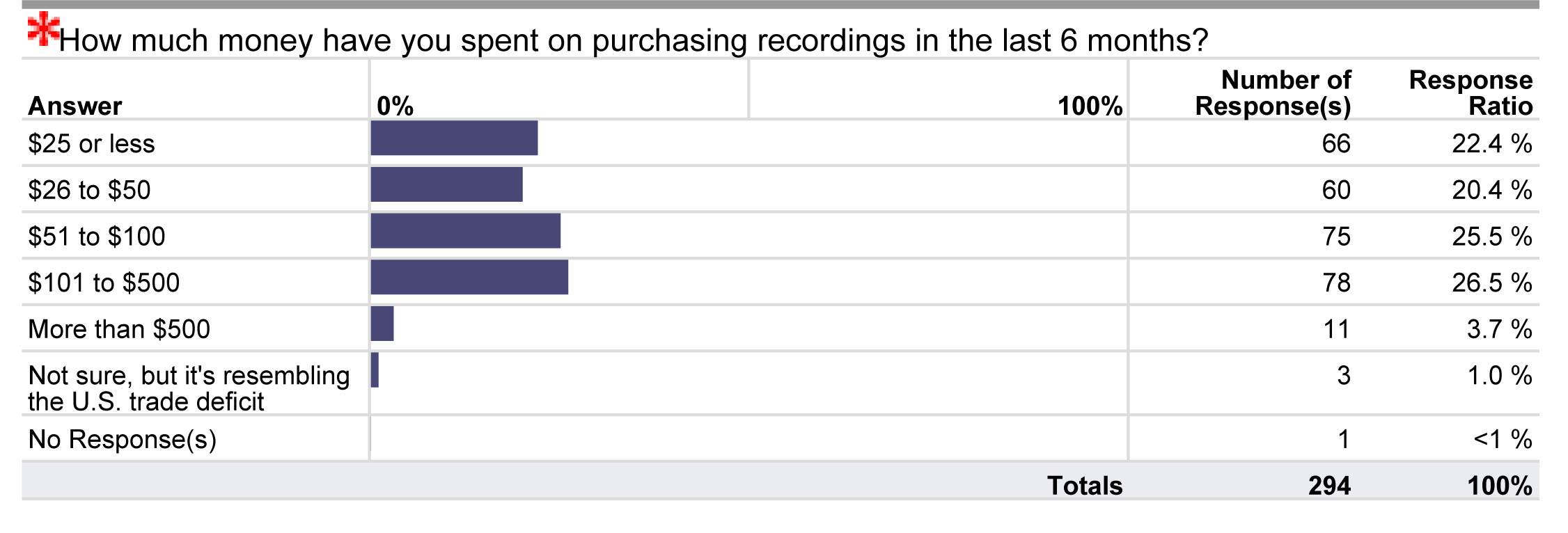
Instrumental music was far preferable to vocal: 60.7% o recordings purchased were symphonic music, 34.8% oera, 53.9% camber music, and 46.7% slo instrumental.
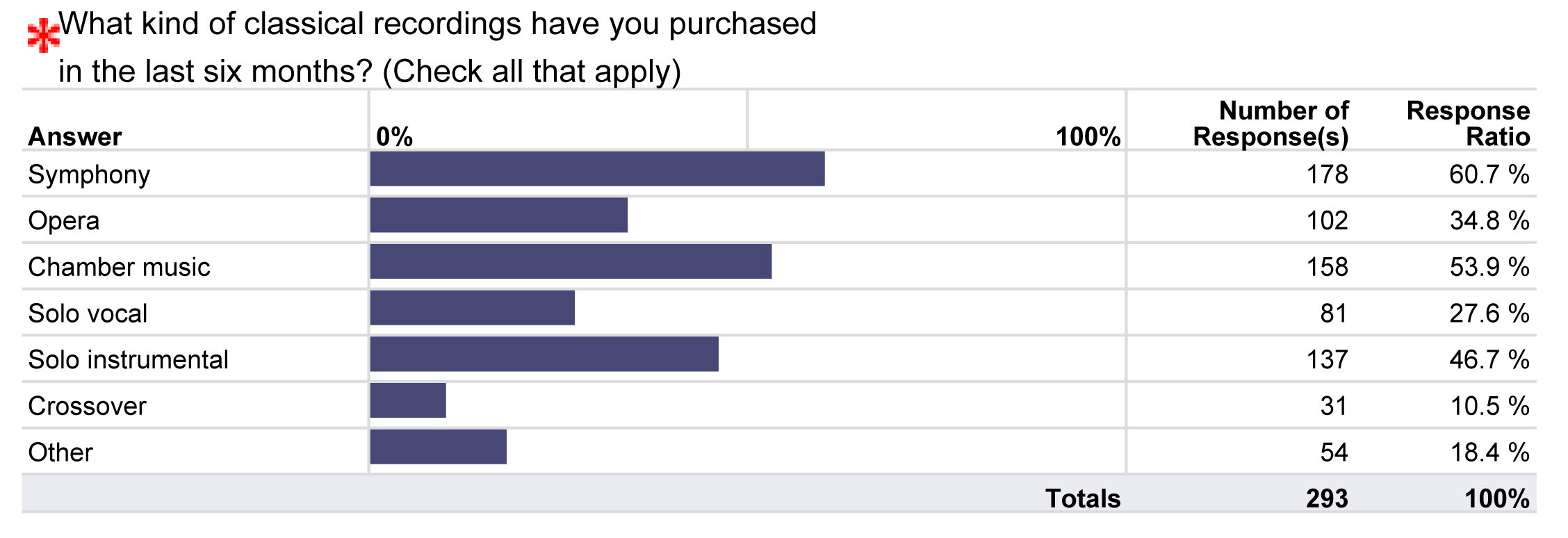
Among genres other than classical, pops and hip-hop recordings were the least favorite, jazz the most, at just 6.5% aove pop/rock/r&b.
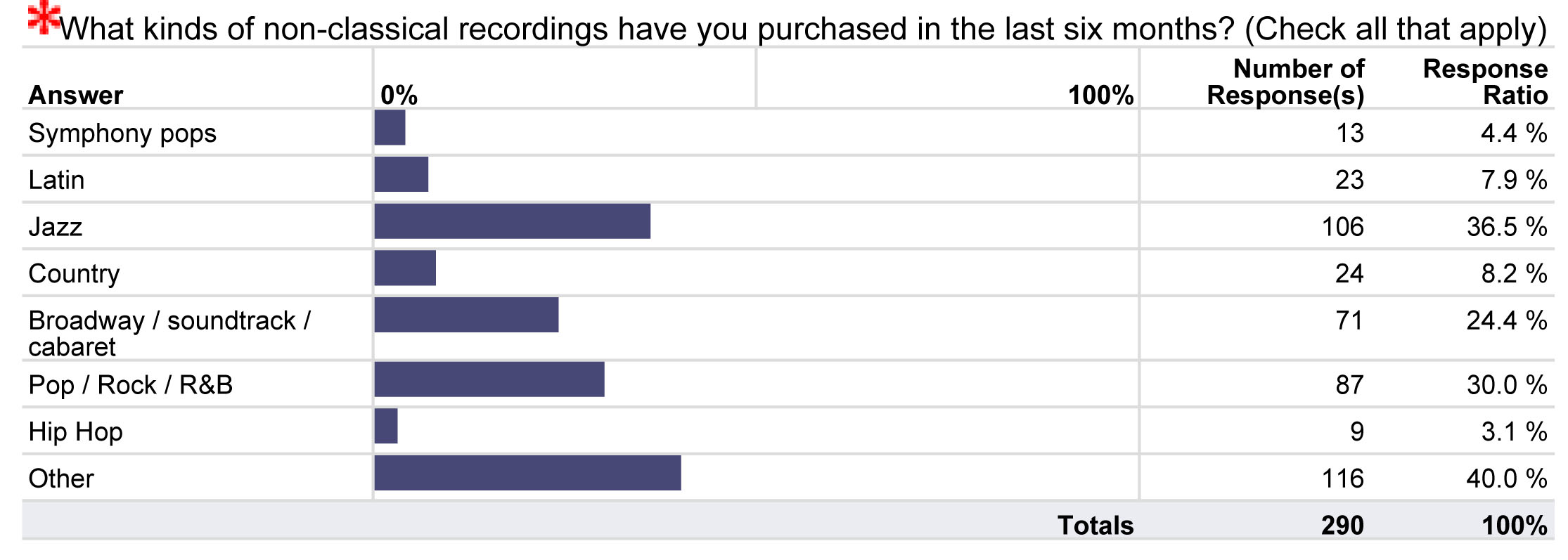
CDs are far more popular than downloads, according to the respondents, followed by digital album downloads and then closely by the downloading of single tracks.

A few comments about the recording format purchases:
- “I still believe in CDs, but realize that many others are into downloads and streaming. It is unfortunate that getting music for free is taking over buying it. That does not speak well for the future of musicians.”
- “Only view or listen to free stuff—I guess it is being paid for by advertising dollars.”
- “No downloads, ever. Downloading only works for kids.”
- “Streaming is poor quality.”
- “I like program information with the music I buy, e.g., CD booklets, liner notes.”
- “I prefer to own something physically.”
- “I’m a Spotify paid subscriber and listen to new classical releases all the time, as part of the flat subscription rate.”
- “I have an apartment full of CDs and LPs. Why on earth would I download or stream?”
- “I buy my music almost entirely in DTS-HD Blu-rays because the sound is vastly superior to CD’s.”
- “I have shifted from buying CDs to buying music online, but I find it very difficult to sync things on my various devices.”
- “I love being able to stream U.S. and European performances...have been watching some from England.”
- “I buy vinyl almost exclusively.”
- “All the formats have advantages and disadvantages. CDs have program booklets….Downloading … makes it easy to bring music to lectures or events while traveling. But the information that comes with downloads is usually terrible or missing.”





 FEATURED JOBS
FEATURED JOBS

 RENT A PHOTO
RENT A PHOTO


